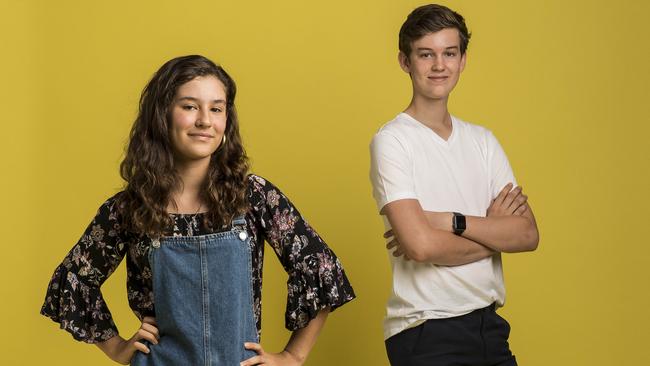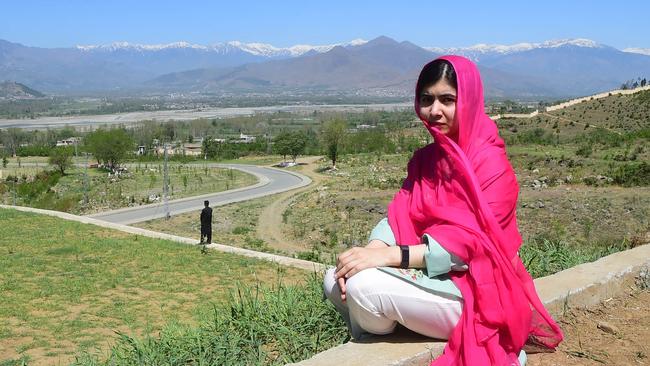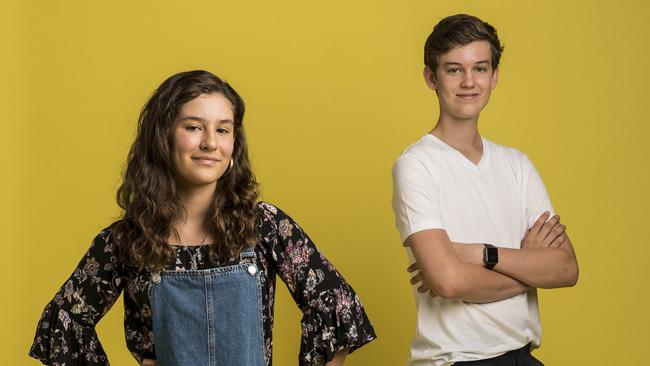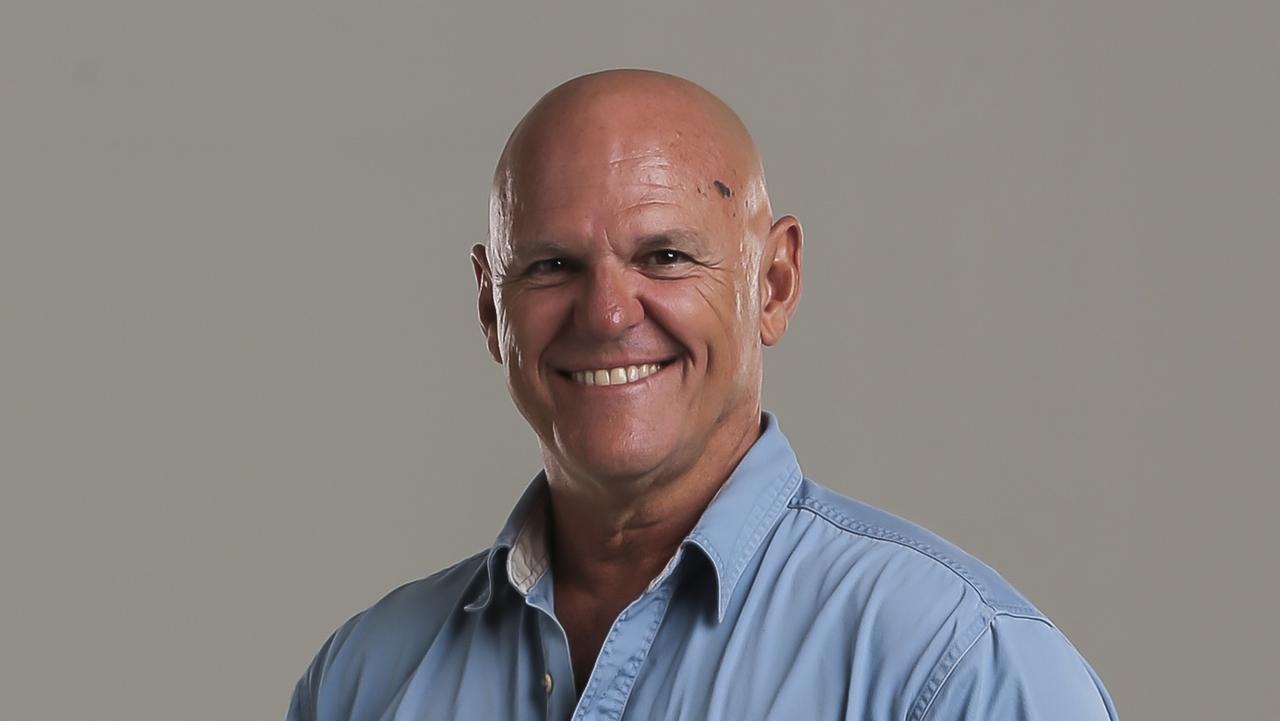Gen Z healthier and safer than previous generations and ready to change the world
THEY know how to pose, but aren’t poseurs. They have the confidence to burn, but aren’t power crazy. They’re glued to their phones, but don’t call them the “selfie generation”. They are Generation Z, and experts say they will change this world for the better.

U on Sunday
Don't miss out on the headlines from U on Sunday. Followed categories will be added to My News.
These two teens know how to pose, but are not poseurs. They have confidence to burn, but are not power crazy. They may be glued to their phones, but don’t call them the “selfie generation”.
They are part of Generation Z. Born between 1995 and 2009, there are 4.5 million of them in Australia and experts say they may well be the ones who will change this world for the better.
Sitting in an inner-city Brisbane cafe, Leilani Chia, 15, announces over her chai latte that she is going to retire early. Without a flicker of doubt she declares her life plan.
“I’m going to be a doctor. I will retire while I am still young and then start up some kind of business,” the Year 10 Brisbane schoolgirl says.
Leilani knows who she is. She’s optimistic about the future and has strong views on consumerism, sex and drug use.
Politely waiting his turn to speak, Elijah Larsen, 16, is composed, mature and thoughtful. There are no teenage boy grunts here – he is eloquent and intelligent. “I personally don’t like the term ‘selfie generation’. Truth is, I rarely take photos of myself,” Elijah says, sipping on an iced chocolate.
If Elijah is glued to his phone he is more likely to be reading about world politics than scrolling through Instagram. The Year 11 student has his sights set on completing a double degree in business management and economics. He says he is a typical teen, hanging out with his friends and going to movies, but says they love to get into heavy intellectual debate. He is an independent self-starter. After school he rolls up his sleeves and gets stuck into his part-time job.
Meet Gen Z. They are skipping up behind the much-maligned Millennials who carry the label of being spoiled – lapping up a materialistic life, preferring to indulge in latte and smashed avo on sour dough than building a bank account.
In contrast, Gen Z are being pegged “generation responsible” – the ones to clean up the mess of previous generations. They drink less and smoke less than previous young generations and few take drugs.
A 2018 Deakin University study shows that the number of teenage boozers fell from 69 per cent to 45 per cent between 1999 and 2015. They might be sexting, but a big US study says they have sex much later than other generations.
Never without their phones, Gen Zers never knew a world without the internet and social media. But don’t call them narcissistic. They care about the world they are about to inherit. This “generation responsible” has a loud and steady voice and is not afraid to use it.
Elijah and Leilani are two voices in that generation. They are not quite kids but not yet adults. Both are stuck in that teenage space that can often render young people powerless. But looking past their youthful giggles, these two young Queenslanders are confident, independent teens, stomping all over teen stereotypes.
Among their cohort is poster girl Malala Yousafzai, born in 1997. While still a teenager, the Pakistani activist spoke out publicly against the Taliban’s ban on girls being educated. She grabbed the attention of the world when she survived an assassination attempt at age 15.
In 2014 Malala and Kailash Satyarthi were jointly awarded the Nobel Prize for Peace honouring their fight for children’s rights. They are politically aware and want a say.

Gen Z again took centre stage globally when the survivors of the recent Parkland massacre called for a revolution to curb gun violence in the US. In Australia, during last year’s referendum on same sex marriage, Australian Bureau of Statistics data revealed that 78.2 per cent of Australians aged 18 and 19 voted – more than any other age group under 45. The participation rate was lowest among Millennials aged 25 to 29.
Australian social demographer Mark McCrindle says these youths are like no other.
“This is the generation that really could change the world,” McCrindle says.
“Gen Z have been raised by Gen X parents to be economically rational and hard workers. The word ‘entitled’ does not apply. They have been shaped to take control of making their own money and paying their own bills. They are collaborative and not power crazy. They want to be problem solvers with minimum fuss.”
The social commentator says that today’s school leaver is likely to have 17 jobs across five careers and live in 15 homes in their lifetime.
“They are casually mobile and flexible. They have grown up in fast-moving and complex times. Change is not frightening,” McCrindle says.
Elijah already has a job cleaning up at the local butcher’s shop. It’s bloody work that requires a pair of hefty gumboots, a strong stomach and plenty of back bone. He uses his wages to buy hiking gear – not designer trainers.
“There is no chance of me being a vegetarian,” he jokes.
Leilani chimes in that she would love to be a vegetarian but thinks an active teenage girl needs her protein. She does, however, buy all her clothes in second-hand stores as she hates the throwaway retail habit that leaves unworn clothes in landfill. She has seen first-hand from friends the instant regret that comes from cyber bullying and would never go there. She’s heard of teens who smoke a bit of pot. She is not afraid to try it, she just doesn’t want to.
Elijah loves US politics – more than Australian. He says politics is a global issue in 2018.
“I love monitoring Donald Trump’s antics. In my opinion he’s not malicious, simply plain dumb,” the A-student says.
Interest in his place in the world provoked Elijah to start reading Jordan B. Peterson’s controversial 12 Rules for Life, and he likes the ideas about living up to responsibility.
“He lectures on everything from mythology to Hitler. His recent book, 12 Rules for Life, is a fascinating read. I don’t agree with everything he says – like his ideas on gay marriage, which I am a supporter of – but I really am intrigued by how well he articulates his debates and speeches, his ideas … to call anyone my hero would be a stretch, but right now Jordan Peterson is someone I look up to,” Elijah says.
This iGen simply does not run with the same ideas as their parents. They are intense thinkers who are happy to tackle problems in their own pragmatic way.
“I think the movement away from beliefs and knowledge being hereditary will lead to a generation of critical thinkers. No good can come from dwelling on the shortcomings of our predecessors,” Elijah says.
“There is nothing worse than resigning to the life you wish you weren’t living.”
Parents are playing their part in teenagers drinking less. The Deakin study shows that supply by parents dropped to 12 per cent in 2015 from a 22 per cent high in 2007.
“I think that a little underage drinking is better than nothing because it means that you have the experience and when you are of age you don’t become knockout drunk. But when I go out to a friend’s house for a party it is very low key with no alcohol. We don’t need it to have fun,” Leilani says.

Tobacco use has also dropped in this age group, falling from 45 per cent to 10 per cent between 1999 and 2015.
Rebecca Lang, chief executive of the Queensland Network of Alcohol and Other Drug Agencies (QNADA), says only a small proportion of young people aged 12 to 17 have used alcohol or drugs in their lifetime and on the whole, use has been stable or in decline since 2008.
Both teens agree that peer pressure is on the slide.
“Honestly, everybody at school is pretty chilled and people seem confident to make their own decisions,” says Elijah, who attends a mixed-sex school.
Leilani is also an A-student at an all-girls school and her studies are a priority if she is to get into medicine. Her life is full with barely a minute to spare. Mum’s “taxi” rarely runs cold as Leilani dashes from school to dance classes. She allocates 12 hours a week to ballet and contemporary dance.
“People assume teenagers are lazy and they don’t work hard but school is really hard and takes a lot of time,” Leilani says.
Neither of these impressive teens are too worried if you don’t understand their lifestyle or don’t get their digital dependence, they just want you to look beyond the stereotypes. If you are going to put them in a box, label it with the word “respect”. They make no excuses for being glued to a screen. They were born into technology and grew up looking at screens rather than human faces, but that hasn’t impeded Elijah or Leilani’s people engagement skills. They face the same challenges and temptations around sex, booze and drugs as their parents did, but for them everything is documented, recorded.
“I think that social media doesn’t necessarily create egotists but it does create a platform of comparison. It makes it so much easier to be insecure,” says Leilani who, like Elijah, is no fan of selfies.
Technology has shaped them into who they are – globally connected, environmentally aware and community-minded. Technology will be the saviour for many Zs despite the dark corners of cyberbulling or sexting.
“Bullying is not something I have come across but I do know of girls who got involved in cyberbullying and the fallout was not good. They learned a big lesson. It was a lesson to us all,” she says.
Elijah thinks boys are less likely to get involved in cyberbullying than girls: “It is my personal perception that boys are pretty straightforward. If they don’t like someone they just stay out of their way.”
These kids are healthier and safer than previous generations and are growing up more slowly. A report in the international journal Child Development late last year revealed that they are having less sex.
The study by San Diego State University and Pennsylvania’s Bryn Mawr College showed the percentage of Year 12 students who have had sex dropped from 67 per cent in 1990 to 58 per cent in 2015; with Year 10s dropping from 48 per cent to 36 per cent over the same period.
But both Leilani and Elijah say that peers do judge kids who announce they have had sex.
“I feel like if you’re over age and you are with someone for a long time and you trust them and you don’t go around telling everyone about it, it’s fine,” Leilani says.
“Boys are learning to be more respectful. I still hear a lot of sexual harassment stories but this is also coming from older generations.”
McCrindle says it is time for the older generations to offer wisdom, guidance and support to this young generation to help them make a positive difference in their era and to pave the way for the generations that come after.
Gen Z may be the last of the letter generations, but for them it’s just the beginning.



